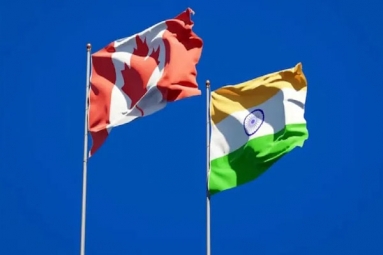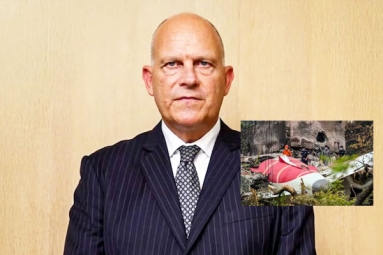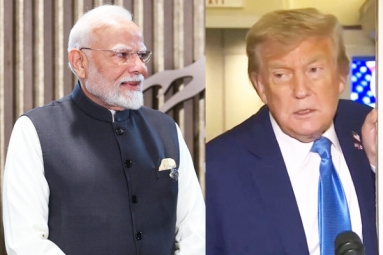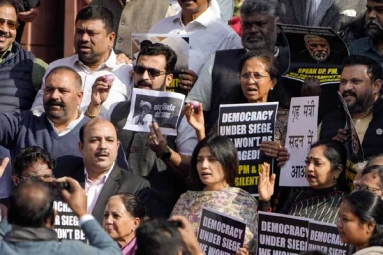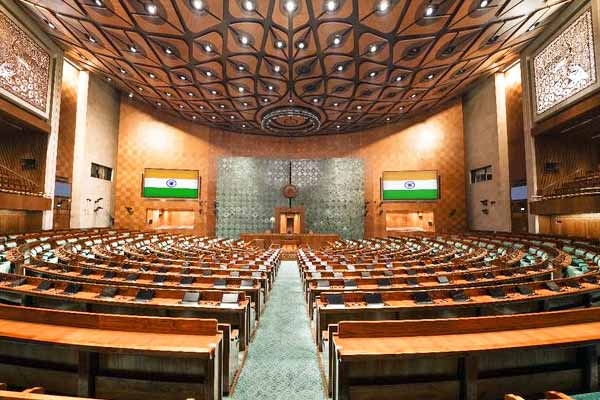
(Image source from: x.com/LokSabhaSectt)
The Indian parliament, the Lok Sabha, has seen a significant rise in the number of wealthy legislators. According to the Association of Democratic Reforms (ADR), a staggering 93% of the winning candidates in the 2024 elections were crorepatis, individuals with assets over 1 crore rupees. This figure has been steadily increasing, from 88% in 2019 to 82% in 2014 and 58% in 2009. The richest candidate in the 2019 elections was Ramesh Kumar Sharma, with assets worth a whopping 1,108 crores. In the current Lok Sabha, the three wealthiest members are Chandra Sekhar Pemmasani of the TDP, Konda Vishweshwar Reddy, and Naveen Jindal of the BJP. Pemmasani, the TDP candidate from Guntur, Andhra Pradesh, stands out as the wealthiest MP, with assets valued at 5,705 crores, including 5,598 crores in movable assets and 106 crores in immovable assets. Pemmasani, the founder and CEO of the online learning platform UWorld, was awarded the prestigious Ernst & Young Entrepreneur of the Year Award in 2020.
The doctor, Pemmasani, has an impressive educational background, having studied health sciences in 1999 and later earning an MD in internal medicine from the Geisinger Medical Centre in Pennsylvania in 2005. Despite his medical achievements, he has amassed significant wealth, owning two Mercedes, a Tesla, and a Rolls Royce. When asked about his affluence, Pemmasani acknowledged that "politics has become an expensive process" these days, implying that the cost of political involvement has risen. He further noted that "not common people" can easily contest in elections anymore.
The second wealthiest candidate elected to the Lok Sabha is BJP's Konda Vishweshwar Reddy, who contested from the Chevella seat in Telangana. Reddy's assets are valued at a staggering Rs 4,568 crore, making him one of the richest individuals in Indian politics. Reddy's educational background includes a Bachelor's degree in Electrical Engineering from the University of Madras and a Master's degree from the USA. He is also an IT entrepreneur, further contributing to his vast wealth. Reddy's wife, Sangita Reddy, is the joint managing director of the Apollo Hospitals Group, founded by her father, Dr. C. Prathap Reddy. Sangita Reddy owns 24.32 lakh shares of the company, worth a remarkable Rs 1,500.85 crore, while Reddy himself holds 17.77 lakh shares worth Rs 973.22 crore.
Reddy, a Member of Parliament from India, is the sole individual to be awarded a US patent during their tenure in the legislature. In the election, Reddy garnered a significant lead, securing 8,09,882 votes, while his closest competitor, G Ranjit Reddy of the Congress party, received 6,36,985 votes. Reddy's political journey began with the BRS (formerly TRS), and he was elected as the MP from Chevella. Later, he left the party to join the Congress, but his bid for the 2019 general elections proved unsuccessful. Thereafter, he aligned himself with the BJP.
Naveen Jindal, a prominent industrialist, is the third wealthiest individual to be elected to the Lok Sabha. At 54 years old, he emerged victorious in the Kurukshetra constituency of Haryana, boasting assets worth a staggering Rs 1,241 crore. Jindal, the chairman of Jindal Steel and Power Limited, hails from a prominent family – his mother, Savitri Jindal, is the chairperson of the OP Jindal Group and India's richest woman, with a net worth of $35.5 billion. In the recent election, Jindal defeated the Aam Aadmi Party's Sushil Gupta by a margin of 29,021 votes. After two decades as a member of the Congress party, Jindal has now joined the BJP, expressing his desire to contribute to Prime Minister Narendra Modi's vision of a 'Viksit Bharat'. Jindal's political journey has been marked by success, as he won the Kurukshetra seat in both 2004 and 2009 while the Congress-led UPA was in power. However, in 2014, when the Modi wave swept the nation, Jindal lost his seat to Raj Kumar Saini.
The analysis of the financial backgrounds of the winning candidates in the 2024 Lok Sabha elections reveals a significant wealth disparity. Data shows that an overwhelming majority of the successful candidates from the Samajwadi Party, AAP, JDU, and TDP are millionaires, with assets exceeding Rs 1 crore. In fact, all the winning candidates from these parties fall into the crorepati category. Interestingly, the analysis suggests that a millionaire candidate has a much higher probability of clinching victory, standing at 19.6%, compared to just 0.7% for those with assets less than a crore. The data also provides a breakdown of the wealth distribution among the winning candidates, with 42% possessing assets of Rs 10 crore and above, 19% within the Rs 5-10 crore bracket, and 32% holding assets between Rs 1-5 crore. Only a meager 1% of the successful candidates have assets worth less than Rs 20 lakh. The analysis further delves into the financial backgrounds of the major political parties, revealing significant disparities in the average assets per winning candidate. The TDP leads the pack with an average of Rs 442.26 crore per winner, followed by the BJP with Rs 50 crore.
The political landscape reflects a diverse financial landscape, with the DMK reporting assets of Rs 31.22 crore, the Congress at Rs 22.93 crore, the TMC at Rs 17.98 crore, and the SP at Rs 15.24 crore. This analysis underscores the contrasting financial profiles of successful candidates, where some possess substantial wealth, while others have more modest means. For example, Jyotirmai Singh Mahato of the BJP from Purulia, West Bengal said his net worth is only Rs 5 lakh. Similarly, TMC's Mitali Bagh, who hails from Ambarak in West Bengal, has assets worth Rs 7 crore. SP Priya Saroj from Machilishar, Uttar Pradesh has assets worth Rs 11 crore. The analysis also identifies candidates with higher responsibilities. TDP Pemmasani ranks first with loans over Rs 1,038 crore. Jagatratsakan of DMK from Arakkonam in Tamil Nadu with Rs 649 crore and Prabhakar Reddy Vemireddy of Telugu Desam Party from Nellore in Andhra Pradesh with Rs 197 crore.





